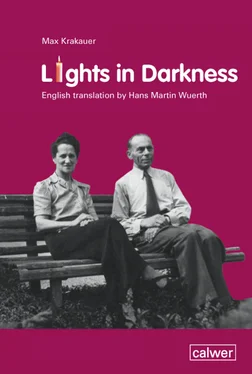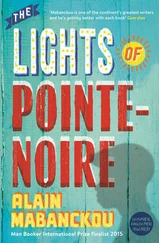My friend’s son was at home. Legally he was a “Mischling” in the first degree, as was his friend who had found accommodations in our former home by pure chance. This friend’s father, as well as these two boys, declared their willingness to remove some of our belongings from our home by breaking the police seal. This was a daring plan, but we gladly approved of it because, except for the clothing we had on, we lacked even the most essential things. Here we were, two miserable and helpless human beings who were also defenceless and powerless against our brave helpers. They gave us only those items that they and their girlfriends couldn’t use for themselves or couldn’t convert into quick cash. We were told about this special version of aid by the participants themselves, because quite soon they betrayed each other in our presence, quarrelling over the question of how best to split up their booty.
Nevertheless, some of our belongings reached the home of our Christian widow-friend, where we picked them up or from where we had them delivered to us. Even then the boys hesitated to turn our things over to us, but we were not possessive, nor could we afford to be. As once again we needed these boys’ assistance in getting groceries and food rations at the usual high prices now charged in Berlin.
Incidentally, we would soon learn about the dangers involved in hiding people like us. No sooner had we left for a while, when Gestapo officials showed up in our hostess’ home and, with their pistols cocked, searched for us in every room. Fortunately, the two women officials living below were not home and could not give the Gestapo any hint, with the result that this search had no further repercussions. But we got the point. Already the police had compiled a complete list of our relatives and friends and were conducting a painstaking search of their residences. Thus we could no longer solicit their help. Now what? What would the next night present?
Only a few weeks before, a woman friend of ours had introduced us to Herr Hans Ackermann who resided in Berlin-Tempelhof, Alboinstrasse 49. After this friend had been deported, Ackermann visited us from time to time and brought us groceries. During one of these visits he mentioned that he would be more than happy to offer us shelter if this became necessary. We now remembered this man whose ties with us were unknown to the Gestapo. We went looking for him, but discovered a Jewish woman there we both knew and who was being hidden by Ackermann. In spite of this reality, this exceptionally caring man, a bachelor and retired public official, refused to let us go and was happy to welcome us in his tiny two-room apartment. The two women lived in one room – one of them slept on the floor – while our host shared the other room with me. In addition to us, Mr. Ackermann’s darling pets lived there as well: four large tomcats.
We lived off the food rations we had purchased, the food secretly given to us by friendly merchants, and off the few rations our friend Ackermann shared with us. We entered and left the house secretly because the other residents in the house, especially the overseer in our block, had to be kept in the dark about our presence. Just as touching as this man’s loving care shown us, was his love for his sister, a retired school teacher who did not live with him. However, the presence of three total strangers naturally meant that this seriously limited the freedom and movement of a man who was not in the best of health. Nonetheless, he accepted this graciously and did his best not to let this situation affect him. But we sensed more and more how he was sacrificing himself for us, and we became quite desperate. But he rejected all of our concerns for him and told us to stay with him as long as it took to find another shelter.
But all of our efforts in this regard were in vain. What gave us strength to explore new opportunities after each failure was the general situation the country was in. This was at a time when the battle of Stalingrad took place. A large segment of Berlin’s population already counted on an early German collapse. Until this happened, we had to survive at any cost. Each day meant winning another round while struggling in profound misery on a daily basis. If we had known that the moment we longed for so much would not come until April of 1945, we probably would have lacked the courage to face the difficult journey ahead. An easier decision on our part would have been to end our lives by surrendering, or by committing suicide.
The frequent bombing alarms and air bombardments we survived on the top floor of this poorly constructed row-house, posed a grave danger to our friend and to us. We could not enter the air raid shelter out of fear of being recognized. On March 1, 1943, the first heavy attack on Berlin took place. As always, we sat in our apartment when the impact of bombs came ever closer, shaking and swaying the whole house. We had no choice but to run to the basement for safety. Ackermann came to our rescue when he introduced us to the other tenants as strangers he had personally pulled off the street. Destruction and fires were reported in the entire neighborhood, and the raid seriously damaged Ackermann’s flat. Although it was barely useable, orders were given to vacate it. Each damaged residence was inspected by several party officials, and we expected confrontation by the police during such an inspection. Therefore, we and the other lady who had found lodging in Ackermann’s flat were obliged to pack the few things we had and leave.
The government’s control over its people became tighter the longer the war continued and the more unfavourable the reports were that reached us, particularly those from the eastern front. All of us were terrified by the Gestapo. I remembered a friend in Berlin I had met back in 1910 or 1911 who had helped us often. But when I described our predicament to him, why we were fleeing from the Gestapo and why we needed his help – I never even mentioned a plea for overnight accommodations – he requested not to be harassed again. Fear had become a force that completely dominated people’s lives. What hope was left for us?
It rained hard when we stood in the streets of this metropolitan city without protection, each of us carrying a briefcase containing the most essential toiletries. We were more perplexed than ever. To try to reach our acquaintances was out of the question. But we remembered a family in Schöneberg we once met quite superficially. The man was Jewish. This family was quite aware of the dangers involved, but they wanted us to stay at least for the night. To be prepared for a possible visit by the Gestapo, we slept partially dressed, I at this family’s place, my wife at Ms. Balzer’s apartment across the hall. The large house had a rear exit that, should it become necessary, would facilitate our escape. The following day we continued our search for a place to stay, but without success. So we returned to Schöneberg in a state of anxiety. These same people took us in for another night and, at the insistence of Ms. Balzer, for a third. We left them during the day and returned only late in the evening. The fear of being questioned by the Gestapo turned the few hours at night into hell in spite of everyone’s effort to be kind to us.
On several occasions we met our friend Ackermann at some street corner. During one of our conversations we recalled a comment made by Ms. Balzer that the Confessing Church would protect persecuted people, people such as us. But Ms. Balzer was unable to give us specific details. Perhaps Ackermann could be persuaded to present our case to his pastor. Ackermann was reluctant to try and preferred to do this personally. However to this suggestion we replied that the danger was too great for us, and that it would be better if he asked his pastor, but with utmost caution. He finally consented to our pleas and left to see his pastor, a Dr. von Rabenau. With high expectations we wandered through the streets, unable to come up with one single idea that could work. Of course, it had come to our attention from different sources that people who shared our fate were being hidden in Berlin. But how would one make contact with such shelters? All of our earlier inquiries had been to no avail. For this reason the intervention of our friend Ackermann represented our last hope. If he returned empty-handed, then our confrontation with fate was unavoidable and irrevocable.
Читать дальше












